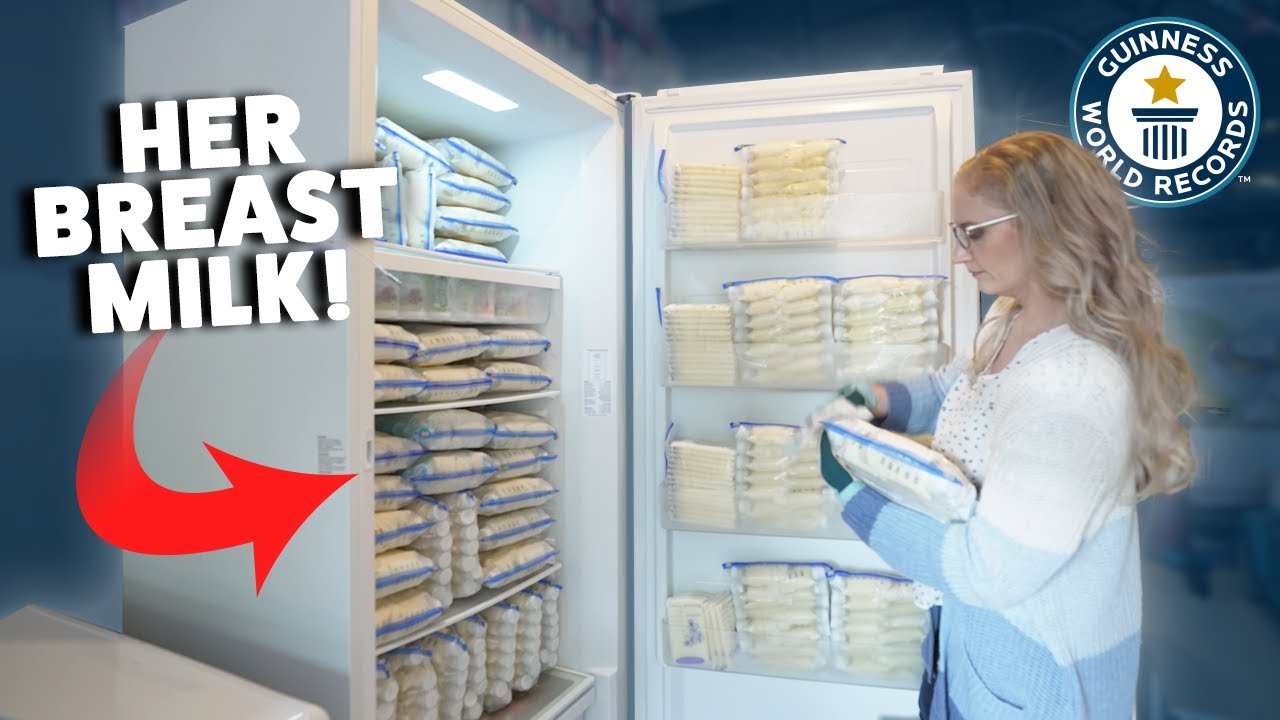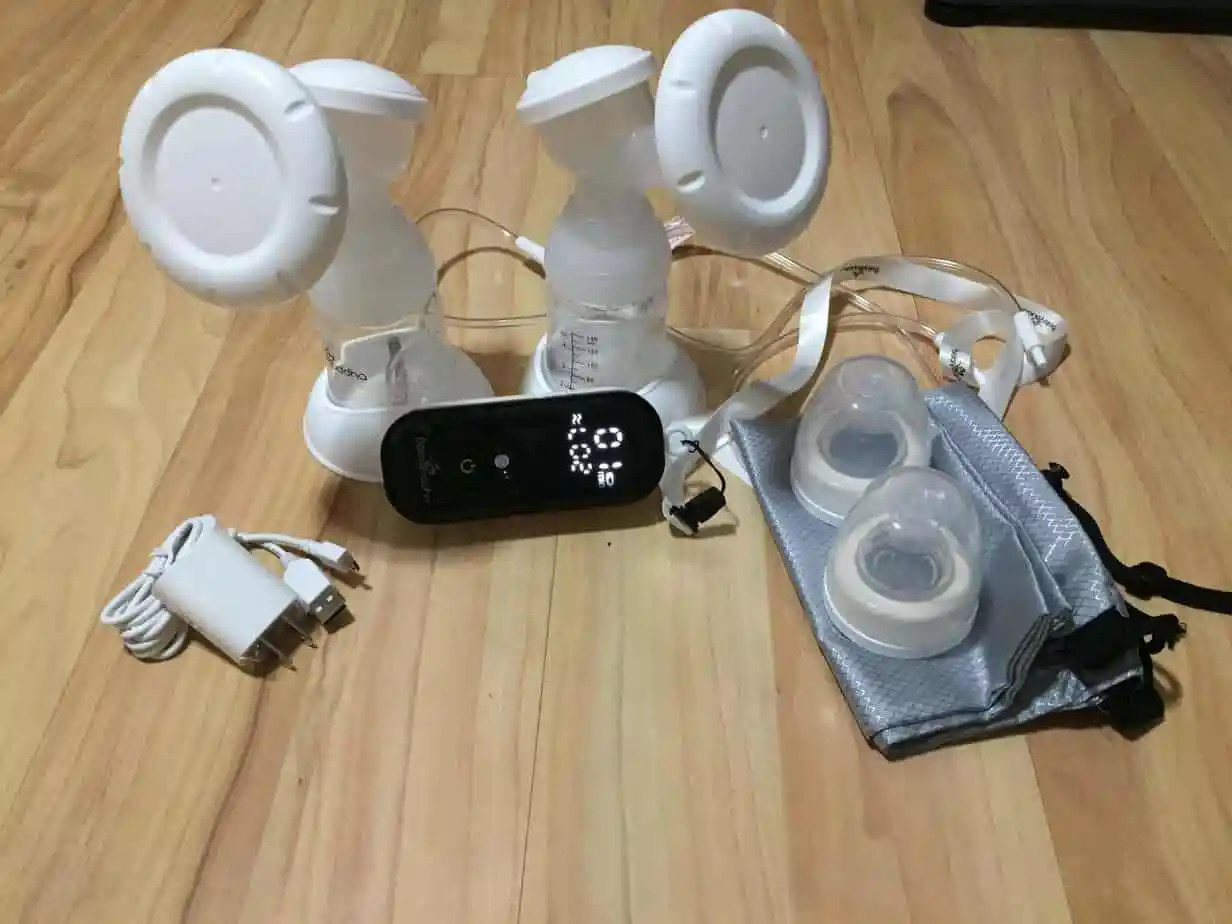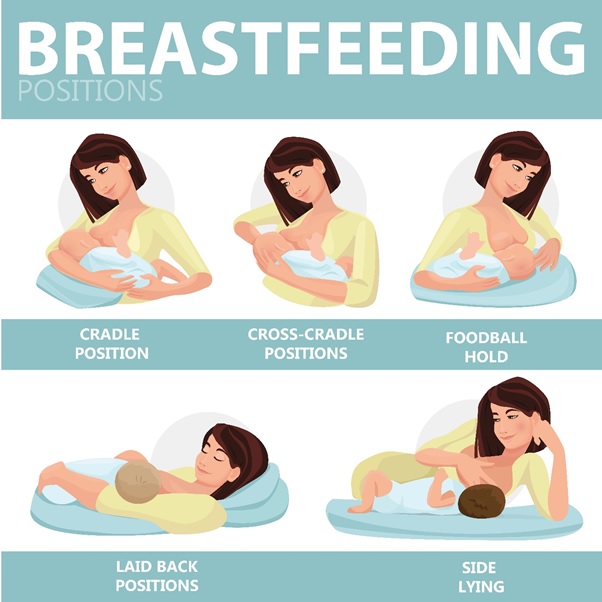Guinness World Record Largest Donation Of Breastmilk By An Individual Nourishes Thousands Of Premature Babies
In a heartwarming display of selflessness, Elisabeth Anderson-Sierra, a devoted mom of three, has achieved an extraordinary milestone by breaking the Guinness World Record largest donation of breastmilk by an individual.
Author:Dr. Felix ChaosphereReviewer:Xander OddityAug 07, 20231.1K Shares69K Views

In a heartwarming display of selflessness, Elisabeth Anderson-Sierra, a devoted mom of three, has achieved an extraordinary milestone by breaking the Guinness World Record largest donation of breastmilk by an individual.
Her unwavering dedication and compassion have enabled her to nourish thousands of children worldwide, including premature babies, and her impact extends far beyond the official record. This remarkable journey showcases the power of one individual's act of kindness in transforming lives and normalizing the invaluable practice of milk sharing.
Nourishing Thousands Of Children With Record-Breaking Breastmilk Donation
Elisabeth Anderson-Sierra, a devoted mom of three from Aloha, Oregon, USA, has captured the hearts of many with her exceptional act of kindness that has touched the lives of thousands of children, particularly premature babies. Her extraordinary journey led her to achieve a monumental feat - breaking the Guinness World Record largest donation of breastmilk by an individual. Between 20th February 2015 and 20th June 2018, she donated a staggering 1,599.68 liters (56,301.20 UK fl oz) of breastmilk to a milk bank.
“„This only accounts for milk that I donated to a milk bank between the years of 2015 and 2018.- Elisabeth Anderson-Sierra
Elisabeth shared, humbled by the record-breaking achievement. Yet, her remarkable contributions extend beyond the official record, with an estimated total donation of over 350,000 ounces of breastmilkto countless families worldwide over the past nine years.
Elisabeth's altruism is truly commendable, as she donates to many recipients who have been labeled as "failure to thrive." Her breastmilk has been a lifeline for these vulnerable infants, helping them overcome their struggles and thrive in their health. Elisabeth cherishes the moments when she can witness the label of "failure to thrive" being removed from these children's stories, filling her heart with joy and reaffirming why she continues her selfless mission.
In a poignant instance, Elisabeth was in Puerto Rico with her husband after the devastation of Hurricane Maria in September 2017. Amid the challenging circumstances, she remained dedicated to her cause, continuing to pump breastmilk. It was during this time that she encountered a baby in dire need.
Three-month-old Joaquin, born premature and losing his mother due to childbirth complications, was not thriving on formula. Joaquin's father struggled to afford the breastmilk from a milk bank in the States, with daily costs exceeding $200. Elisabeth's compassion knew no bounds, and she promptly offered her breastmilk to Joaquin, transforming his life.
Joaquin took to Elisabeth's breastmilk immediately, and she knew she needed to do more to support him. She made a heartfelt commitment to ship breastmilk to Puerto Rico for Joaquin for an entire year, ensuring his health and well-being during a difficult time.

My Body Won't Stop Making Milk! - Guinness World Records
Elisabeth's ability to produce such copious amounts of breastmilk is attributed to her rare medical condition known as hyperlactation syndrome, which leads to an overflow of milk due to increased prolactin hormone production. While hyperlactation has its challenges, including the difficulty of remaining stationary while pumping, Elisabeth's dedication has remained steadfast. The toll of hyperlactation on her life has been immense, but she never lets any breastmilk go to waste - everything is either used or donated to help those in need.
Super Mom Collaborates With Breast Pump Company
Elisabeth attributes her remarkable breastmilk production not only to her medical condition but also to the equipment she uses as a pumping mom. She emphasizes the importance of the right flange size and a powerful pump, referring to the combination as the "dynamic duo" that significantly impacts milk output.
Her experience as a pumping mom has led her to collaborate with a breast pump company, aiming to support nursing moms and enhance the breastfeeding journey.
“„I have been able to take my experience as a pumping mom and work with a breast pump company to further the technology to support moms on their breastfeeding journey- Elisabeth Anderson-Sierra
Elisabeth shared, expressing her pride in contributing to a pump that is now saving the lives of hundreds of moms worldwide.
“„The BabyBuddha pump changed my life and now in turn it’s saving the lives of hundreds of moms worldwide.- Elisabeth Anderson-Sierra
Hyperlactation has taken a significant toll on Elisabeth, making it challenging for her to be tethered to a wall or stay stationary while pumping.
Switching to a mobile pump has been transformative, shaping her perspective on her actions and enhancing her journey. Despite the inconvenience of regular pumping, Elisabeth takes immense pride in her ability to make a difference for others.
Even with her immense dedication and sense of fulfillment in helping others, Elisabeth acknowledges that she eventually would like to stop pumping. She contemplates medical interventions to reduce her milk production, such as using medication to combat the overproduction of prolactin or considering a double mastectomy to remove the glandular tissue responsible for milk production.
In the meantime, Elisabeth continues to pump, humbled by her Guinness World Records title and hopeful that sharing her story will normalize milk sharing. Her inspiring journey has already sparked awareness and encouragement for others to consider the impact of milk sharing and the immense difference it can make in the lives of vulnerable infants.
What Is Hyperlactation Syndrome?
Hyperlactation syndrome is a condition characterized by an excessive supply of breast milk, which can cause discomfort or harm to both the mother and the baby. This condition can be triggered by various factors, such as overactive milk production, pumping practices, frequent switching between breasts, or having a large number of milk sacs (alveoli).
One remarkable individual who has experienced the challenges and triumphs of hyperlactation syndrome is Elisabeth Anderson-Sierra. As a mother of three, Elisabeth's journey of motherhood has been intertwined with her body's extraordinary ability to produce copious amounts of breast milk.
Throughout her breastfeeding experience, Elisabeth encountered the signs and symptoms of hyperlactation, with her breasts constantly feeling full and uncomfortable, and her baby struggling to cope with the forceful milk flow. Despite the difficulties, Elisabeth's determination and compassion for others led her to make a profound impact on the lives of countless families and premature babies.
Now let's discuss hyperlactation more to help others who are struggling the same.

Oversupply of Breast Milk (Hyperlactation) : Signs, Causes, & Remedies
Signs And Symptoms Of Hyperlactation Syndrome
Both the mother and the baby may exhibit specific signs and symptoms indicative of hyperlactation syndrome. For the mother, these may include having constantly full and uncomfortable breasts even after feeding, leaking a significant amount of milk between feedings, and experiencing sore nipples due to difficulty in achieving a deep latch.
On the other hand, the baby may display signs like frequent choking, coughing, or sputtering during feeding, biting or clamping down on the nipple to manage the rapid milk flow, and short, restless feedings with frequent arching back and latching on and off.
Challenges And Impact On Breastfeeding
Hyperlactation syndrome presents challenges for both the mother and the baby during breastfeeding. The infant may struggle to cope with the forceful milk flow, leading to feeding difficulties, frequent spit-ups, and gastrointestinal discomfort. Additionally, the baby may not be able to receive the fat-rich hindmilk, resulting in imbalances in lactose and fat intake.
For the mother, hyperlactation can lead to constant feelings of fullness, engorgement, and tension in the breasts. The excess milk production may also increase the risk of blocked ducts, mastitis, and sore nipples.
Strategies For Mothers
Mothers dealing with hyperlactation syndrome can adopt various strategies to manage their milk supply effectively. Some recommended techniques include:
- Fully Emptying the First Breast -Prioritize completely emptying one breast before switching to the other during feedings. This helps maintain a balance in fluid, nutrients, and fat content in the milk and prevents the second breast from producing excessive milk.
- Block Feeding -Divide the day into three-hour time periods and feed exclusively from one breast during each period. For example, feed only from the left breast from 9 a.m. to noon and switch to the right breast from noon to 3 p.m.
- Wearing a Supportive Bra -A supportive, yet not overly tight, bra can help alleviate discomfort and reduce milk leakage.
- Consulting a Healthcare Professional -Mothers may seek advice from healthcare professionals regarding herbal or medicinal remedies that may help regulate milk supply.
Promoting Comfortable Feeding For Babies
Ensuring a comfortable feeding experience for the baby is essential when managing hyperlactation syndrome. Some practices to promote ease during feeding include:
- Adjusting Feeding Positions -Position the baby in a sitting position, facing the breast, or with the mother leaning back. These positions allow gravity to slow the milk flow and reduce forceful letdown.
- Feeding Before the Baby Gets Too Hungry -Encourage feeding before the baby becomes overly hungry to prevent aggressive sucking that can lead to a rapid milk flow.
- Burping During Feeds -Burping the baby frequently during feeds can help relieve gas and discomfort caused by swallowing excessive air during feeding.
- Using Nursing Shields -A lactation consultant may recommend using nursing shields to slow down milk flow and prevent choking or aspiration.
Finding Balance And Seeking Professional Guidance
Effectively managing hyperlactation syndrome requires a balanced approach that addresses both the mother's milk supply and the baby's feeding comfort. Seeking support from healthcare professionals, lactation consultants, and support groups can provide valuable insights and personalized solutions.
By understanding the challenges of hyperlactation syndrome and adopting appropriate strategies, mothers can embrace a positive breastfeeding experience and provide their babies with the nourishment they need to thrive. Remember, every breastfeeding journey is unique, and with the right guidance, mothers can navigate the complexities of hyperlactation syndrome successfully.
People Also Ask
Is Hyperlactation Genetic?
Yes, hyperlactation can have a genetic disposition in some families.
What Are The Different Types Of Hyperlactation?
Hyperlactation may be self-induced, iatrogenic, or idiopathic. It can be caused by excessive pumping or breastfeeding.
How Much Breast Milk Can A Person Produce?
For infants between 1-6 months old, the average is around 750 mL/25.36 oz a day. A single breastfeeding session might produce between 54-234 mL/1.82-7.91 oz of milk. The frequency of nursing varies depending on the baby's appetite and milk removal in each session.
Is Breast Milk Healthy For My Husband?
There is no harm in breastfeeding to your husband. The breasts can produce as much milk as required, similar to a mother breastfeeding multiple babies. Stay hydrated, eat healthy, and get enough rest.
How Many Years Can A Woman Produce Breast Milk?
Once your body starts producing milk, it can continue to do so indefinitely, as long as there is demand (a baby to feed or pumping). It is common for children to be breastfed for several years before weaning in many countries.
What Happens To Your Breasts If You Don't Breastfeed?
You may experience milk leakage, soreness, and swelling in your breasts, known as engorgement. This usually improves after a few days, and over time, your body will stop making milk if you don't breastfeed or pump.
Why Do I Still Have Milk In My Breast After 4 Years?
This condition is called idiopathic galactorrhea and may indicate increased sensitivity of your breast tissue to the milk-producing hormone prolactin. Even with normal prolactin levels, it can lead to galactorrhea.
Can I Drink My Own Breast Milk If I'm Sick?
Breast milk has been used for cuts, burns, and wounds to help healing and prevent infections. It is believed to boost the immune system and may help shorten the length and severity of a cold if consumed when sick.
Conclusion
In conclusion, Elisabeth Anderson-Sierra's journey with hyperlactation syndrome has been nothing short of extraordinary. Her dedication and determination have not only allowed her to nourish her own children but also to make an indelible impact on the lives of thousands of others. Through her relentless efforts, she broke the Guinness World Record largest donation of breastmilk by an individual, a testament to her selflessness and commitment to helping families in need.
Hyperlactation syndrome may come with its challenges, but Elisabeth's story showcases the power of human resilience and the boundless capacity of a mother's love. Her journey has inspired others to normalize milk sharing and foster a sense of community and support among breastfeeding mothers.
As we celebrate Elisabeth's accomplishments, let us also acknowledge the importance of raising awareness about hyperlactation syndrome and providing resources and support to those who may face similar breastfeeding challenges.

Dr. Felix Chaosphere
Author
Dr. Felix Chaosphere, a renowned and eccentric psychiatrist, is a master of unraveling the complexities of the human mind. With his wild and untamed hair, he embodies the essence of a brilliant but unconventional thinker. As a sexologist, he fearlessly delves into the depths of human desire and intimacy, unearthing hidden truths and challenging societal norms.
Beyond his professional expertise, Dr. Chaosphere is also a celebrated author, renowned for his provocative and thought-provoking literary works. His written words mirror the enigmatic nature of his persona, inviting readers to explore the labyrinthine corridors of the human psyche.
With his indomitable spirit and insatiable curiosity, Dr. Chaosphere continues to push boundaries, challenging society's preconceived notions and inspiring others to embrace their own inner tumult.

Xander Oddity
Reviewer
Xander Oddity, an eccentric and intrepid news reporter, is a master of unearthing the strange and bizarre. With an insatiable curiosity for the unconventional, Xander ventures into the depths of the unknown, fearlessly pursuing stories that defy conventional explanation. Armed with a vast reservoir of knowledge and experience in the realm of conspiracies, Xander is a seasoned investigator of the extraordinary.
Throughout his illustrious career, Xander has built a reputation for delving into the shadows of secrecy and unraveling the enigmatic. With an unyielding determination and an unwavering belief in the power of the bizarre, Xander strives to shed light on the unexplained and challenge the boundaries of conventional wisdom. In his pursuit of the truth, Xander continues to inspire others to question the world around them and embrace the unexpected.
Latest Articles
Popular Articles


